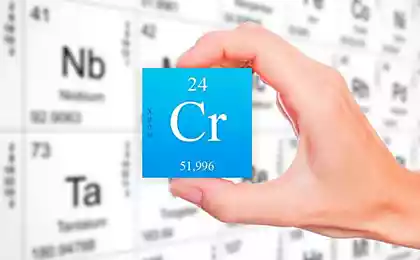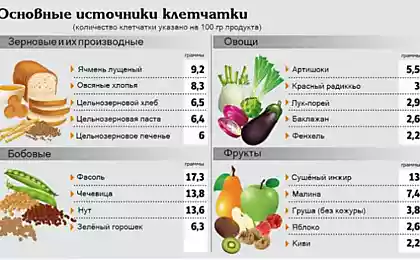464
Chromium is the activator of your metabolic rate
Chromium is a vital element in the human body activates the enzymes involved in the metabolism of carbohydrates; in the synthesis of fatty acids, cholesterol and proteins. Chromium regulates the level of sugar in the blood, increases the activity of insulin, people with high levels of chromium in the body is less susceptible to occurrence of diabetes and atherosclerosis.
It also affects the processes of blood formation and decomposition of excess fat, promotes the resorption of atherosclerotic plaques, a decrease in the concentration of cholesterol on the walls of the aorta, proteins protects myocardium from damage. Stock chromium helps to overcome stress.
Forty three million one hundred ten thousand four hundred fifty four
The daily requirement of chromium in the body of an adult is 50-200 micrograms. For many people may be adequate daily intake of 25-35 µg of chromium. But it does not satisfy the need for chromium in situations of stress, increased consumption of simple sugars, strenuous physical work, infections and injuries. Optimum intake is 150-200 mcg of chromium per day.
A deficiency of chromium in the body can develop with insufficient intake of this element (20 mcg/day or less).
In the body chromium compounds come from food, water and air.
The bioavailability of chromium from inorganic compounds in the gastrointestinal tract is low, only 0.5–1%, but it increases to 20-25% with the introduction of chromium in the form of complex compounds (picolinate, asparaginat).
Hexavalent chromium is absorbed 3-5 times better than trivalent.
Numerous dietary factors influence the bioavailability of chromium. So, absorption of chromium is increased in the presence of oxalate and decreases in iron deficiency. Suction influence also physiological factors, like aging.
The absorption of chromium occurs primarily in the jejunum intestine, while undeveloped chromium is excreted in the feces.
Absorbed chromium is excreted primarily through the kidneys (80%) and to a lesser extent, through the lungs, skin and gastrointestinal (19%). Absorbed inorganic trivalent chromium is excreted mainly by the kidneys in small amounts – with drop down hair, sweat and bile. Large amounts of chromium can be lost in the bile.
The transport of chromium the main role of transferrin and albumin.
The biological role in the human body.
The most important biological role of trace element chromium is in the regulation of carbohydrate metabolism and glucose level in blood because chromium is a component of the low-molecular organic complex of factor glucose tolerance (Glucose Tolerance Factor, GTF).
It normalizes the permeability of cell membranes to glucose, the processes of the cells and depositing, and in this respect operates in conjunction with insulin. Suggest that chromium forms with the insulin complex that regulates the level of glucose in the blood.
Chromium increases the sensitivity of cell receptors of tissues to insulin, facilitating their interaction and reducing the body's need for insulin. It is able to potentiate the action of insulin in all metabolic processes regulated by this hormone. Therefore, chromium is essential for patients with diabetes (primarily type II), as its level in blood at such patients is reduced. Moreover, the high deficit of this trace element can cause diabetophobia state.
The level of chromium is reduced in women during pregnancy and after birth. This chromium deficiency can explain gestational diabetes, although this reason is hardly the only one.
Chromium deficiency in the body, in addition to increasing glucose level in the blood, leads to increased concentrations of triglycerides and cholesterol in blood plasma and, finally, to atherosclerosis.
Chrome affects lipid metabolism, causing the breakdown of excess fat in the body, which leads to normalization of body weight and prevents obesity. The impact of chromium on lipid metabolism is also mediated by its regulatory effect on the function of insulin. Given the above, chromium is important for the prevention of diabetes, obesity and cardiovascular diseases.
When a chromium deficiency in humans and animals disrupted the ability of incorporating 4 amino acids (glycine, serine, methionine and gamma–aminobutyric acid) in the heart muscle.
Chromium improves muscle tone, working capacity and physical force. It helps the fans of weightlifting and bodybuilding to build muscle and improve strength endurance.
In addition, in animal experiments it was shown that a chromium deficiency leads to stunted growth, causes neuropathy and a violation of the higher nervous activity, reduces the fertilizing capacity of spermatozoa. It must be emphasized that the abuse of sugar increases the need for chromium and at the same time, its loss in the urine.
Synergists and antagonists of chrome.Zinc and iron in the form of chelating compounds can act as synergists of chromium.
Seventy nine million five hundred ninety one thousand four hundred eighty nine
Signs of chromium deficiency.
A state of anxiety, fatigue, insomnia, headaches, fatigue, neuralgia and decreased sensation of limbs, impaired muscle coordination, tremors in the extremities, glucose intolerance (especially in patients with diabetes and in persons of middle and old age), changes in the level of glucose in the blood (hyperglycemia, hypoglycemia), increased risk of developing diabetes, inadequate metabolism of amino acids, increased levels of cholesterol and triglycerides in the blood (increase risk of development of atherosclerosis), increased risk of developing coronary heart disease, changes in body weight (weight loss obesity), impaired reproductive function in men.
Now chromium deficiency is quite common. Chromium deficiency can develop in people consuming diets high in simple carbohydrates.
The excess chromium in the body can lead to significant disruption of human health. Despite the fact that chromium is a vital element when excessive flow in the human body chromium is highly toxic.
The main manifestations of excess chromium: inflammatory diseases with a tendency to the mucous membranes (nasal septum perforation), allergic diseases, in particular asthmatic bronchitis, bronchial asthma; dermatitis and eczema; asthenoneurotic disorders, increased risk of cancer.
Chromium is essential: diabetes, obesity, osteoporosis, hyperlipidemia, atherosclerosis.
Food sources of chromium: beer, brewer's yeast, cheese, dairy products; meat, calf liver; eggs; mushrooms (champignons, white mushrooms, oyster mushrooms, chanterelles, boletus, honey);
produce: potatoes (especially with skin on), cabbage, chili (Chile) peppers, radishes, beets, tomatoes, Jerusalem artichoke, garlic; herbs: green onion, chives, parsley, rhubarb (petioles), arugula, dill, green garlic, spinach;
beans and cereals: beans, peas, corn, oats, millet, soft wheat, durum wheat, rye and other whole grains, beans, lentils, barley, black pepper;
fruits :quince, pineapple, cherries, figs, cranberry, sea buckthorn, peaches, feijoa, persimmon, cherry, blueberry, mulberry;
dried fruits :raisins, dried figs, dried apricots, dates, prunes; nuts and seeds: peanuts, sesame seeds, poppy seeds, macadamia, almonds, Brazilian nuts, pine nuts, pumpkin seeds, pistachios, hazelnuts;
vegetable oil :corn oil, olive oil; red algae.
9 rituals that will restore your sight five years agoDanger signals with headache — it is IMPORTANT to know!
In the form of a natural complex of chromium present in brewer's yeast, and in this form is absorbed almost completely. In oral administration in the form of mineral salts absorbed by only 3%.
To reduce the chromium deficiency, should not eat sugar, sodas, candy, products from refined white flour, dry cereals, sweetened by sugar substitutes. Excessive intake of sugar chromium losses with urine grow, and the need for it increases.published
Source: www.pharmacognosy.com.ua/index.php/makro-i-mikro-chudesa/khrom-proshchajte-diabet-i-ozhireniye
It also affects the processes of blood formation and decomposition of excess fat, promotes the resorption of atherosclerotic plaques, a decrease in the concentration of cholesterol on the walls of the aorta, proteins protects myocardium from damage. Stock chromium helps to overcome stress.
Forty three million one hundred ten thousand four hundred fifty four
The daily requirement of chromium in the body of an adult is 50-200 micrograms. For many people may be adequate daily intake of 25-35 µg of chromium. But it does not satisfy the need for chromium in situations of stress, increased consumption of simple sugars, strenuous physical work, infections and injuries. Optimum intake is 150-200 mcg of chromium per day.
A deficiency of chromium in the body can develop with insufficient intake of this element (20 mcg/day or less).
In the body chromium compounds come from food, water and air.
The bioavailability of chromium from inorganic compounds in the gastrointestinal tract is low, only 0.5–1%, but it increases to 20-25% with the introduction of chromium in the form of complex compounds (picolinate, asparaginat).
Hexavalent chromium is absorbed 3-5 times better than trivalent.
Numerous dietary factors influence the bioavailability of chromium. So, absorption of chromium is increased in the presence of oxalate and decreases in iron deficiency. Suction influence also physiological factors, like aging.
The absorption of chromium occurs primarily in the jejunum intestine, while undeveloped chromium is excreted in the feces.
Absorbed chromium is excreted primarily through the kidneys (80%) and to a lesser extent, through the lungs, skin and gastrointestinal (19%). Absorbed inorganic trivalent chromium is excreted mainly by the kidneys in small amounts – with drop down hair, sweat and bile. Large amounts of chromium can be lost in the bile.
The transport of chromium the main role of transferrin and albumin.
The biological role in the human body.
The most important biological role of trace element chromium is in the regulation of carbohydrate metabolism and glucose level in blood because chromium is a component of the low-molecular organic complex of factor glucose tolerance (Glucose Tolerance Factor, GTF).
It normalizes the permeability of cell membranes to glucose, the processes of the cells and depositing, and in this respect operates in conjunction with insulin. Suggest that chromium forms with the insulin complex that regulates the level of glucose in the blood.
Chromium increases the sensitivity of cell receptors of tissues to insulin, facilitating their interaction and reducing the body's need for insulin. It is able to potentiate the action of insulin in all metabolic processes regulated by this hormone. Therefore, chromium is essential for patients with diabetes (primarily type II), as its level in blood at such patients is reduced. Moreover, the high deficit of this trace element can cause diabetophobia state.
The level of chromium is reduced in women during pregnancy and after birth. This chromium deficiency can explain gestational diabetes, although this reason is hardly the only one.
Chromium deficiency in the body, in addition to increasing glucose level in the blood, leads to increased concentrations of triglycerides and cholesterol in blood plasma and, finally, to atherosclerosis.
Chrome affects lipid metabolism, causing the breakdown of excess fat in the body, which leads to normalization of body weight and prevents obesity. The impact of chromium on lipid metabolism is also mediated by its regulatory effect on the function of insulin. Given the above, chromium is important for the prevention of diabetes, obesity and cardiovascular diseases.
When a chromium deficiency in humans and animals disrupted the ability of incorporating 4 amino acids (glycine, serine, methionine and gamma–aminobutyric acid) in the heart muscle.
Chromium improves muscle tone, working capacity and physical force. It helps the fans of weightlifting and bodybuilding to build muscle and improve strength endurance.
In addition, in animal experiments it was shown that a chromium deficiency leads to stunted growth, causes neuropathy and a violation of the higher nervous activity, reduces the fertilizing capacity of spermatozoa. It must be emphasized that the abuse of sugar increases the need for chromium and at the same time, its loss in the urine.
Synergists and antagonists of chrome.Zinc and iron in the form of chelating compounds can act as synergists of chromium.
Seventy nine million five hundred ninety one thousand four hundred eighty nine
Signs of chromium deficiency.
A state of anxiety, fatigue, insomnia, headaches, fatigue, neuralgia and decreased sensation of limbs, impaired muscle coordination, tremors in the extremities, glucose intolerance (especially in patients with diabetes and in persons of middle and old age), changes in the level of glucose in the blood (hyperglycemia, hypoglycemia), increased risk of developing diabetes, inadequate metabolism of amino acids, increased levels of cholesterol and triglycerides in the blood (increase risk of development of atherosclerosis), increased risk of developing coronary heart disease, changes in body weight (weight loss obesity), impaired reproductive function in men.
Now chromium deficiency is quite common. Chromium deficiency can develop in people consuming diets high in simple carbohydrates.
The excess chromium in the body can lead to significant disruption of human health. Despite the fact that chromium is a vital element when excessive flow in the human body chromium is highly toxic.
The main manifestations of excess chromium: inflammatory diseases with a tendency to the mucous membranes (nasal septum perforation), allergic diseases, in particular asthmatic bronchitis, bronchial asthma; dermatitis and eczema; asthenoneurotic disorders, increased risk of cancer.
Chromium is essential: diabetes, obesity, osteoporosis, hyperlipidemia, atherosclerosis.
Food sources of chromium: beer, brewer's yeast, cheese, dairy products; meat, calf liver; eggs; mushrooms (champignons, white mushrooms, oyster mushrooms, chanterelles, boletus, honey);
produce: potatoes (especially with skin on), cabbage, chili (Chile) peppers, radishes, beets, tomatoes, Jerusalem artichoke, garlic; herbs: green onion, chives, parsley, rhubarb (petioles), arugula, dill, green garlic, spinach;
beans and cereals: beans, peas, corn, oats, millet, soft wheat, durum wheat, rye and other whole grains, beans, lentils, barley, black pepper;
fruits :quince, pineapple, cherries, figs, cranberry, sea buckthorn, peaches, feijoa, persimmon, cherry, blueberry, mulberry;
dried fruits :raisins, dried figs, dried apricots, dates, prunes; nuts and seeds: peanuts, sesame seeds, poppy seeds, macadamia, almonds, Brazilian nuts, pine nuts, pumpkin seeds, pistachios, hazelnuts;
vegetable oil :corn oil, olive oil; red algae.
9 rituals that will restore your sight five years agoDanger signals with headache — it is IMPORTANT to know!
In the form of a natural complex of chromium present in brewer's yeast, and in this form is absorbed almost completely. In oral administration in the form of mineral salts absorbed by only 3%.
To reduce the chromium deficiency, should not eat sugar, sodas, candy, products from refined white flour, dry cereals, sweetened by sugar substitutes. Excessive intake of sugar chromium losses with urine grow, and the need for it increases.published
Source: www.pharmacognosy.com.ua/index.php/makro-i-mikro-chudesa/khrom-proshchajte-diabet-i-ozhireniye
Emotional balance: what to do if you come to understand that you don't appreciate
Insult: INTENTIONAL – the main symptom























